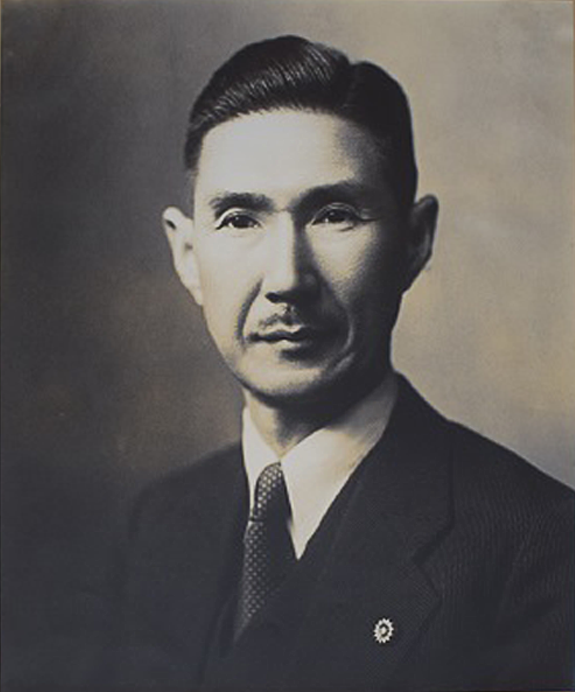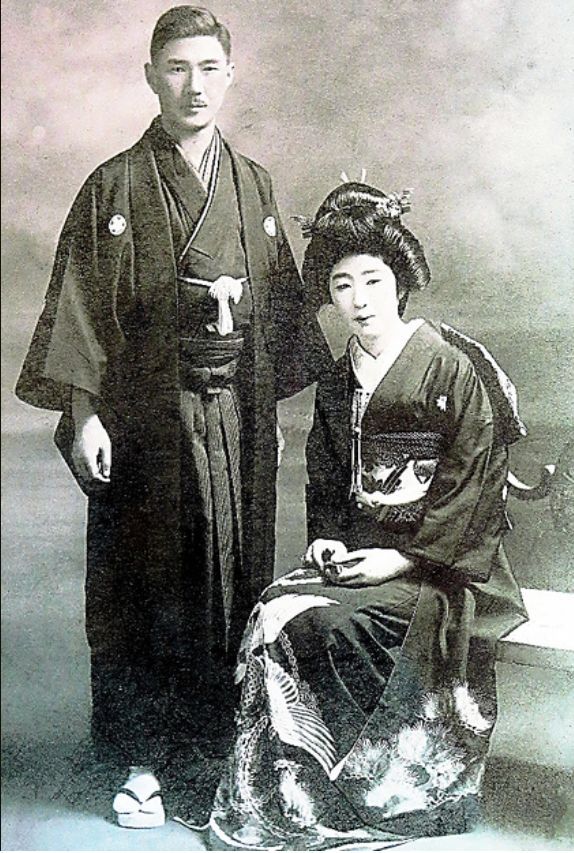1. Early Life and Education

Kan Abe was born on April 29, 1894, in the village of Heki (now part of Nagato) in Yamaguchi Prefecture. He was the eldest son of Abe Hyōsuke and Tame. The Abe family was a notable lineage of landowners and producers of sake and soy sauce in Heki, and they had historically served as nanushi (village heads) during the Edo period. His father, Hyōsuke, was adopted into the Abe family from the prominent Mukunoki family in Ōtsu District upon his marriage, and his mother, Tame, was the sister of Abe Shintaro, who was considered a pivotal figure in revitalizing the Abe family's standing.
Tragically, both of Abe's parents died by the time he was four years old, leaving him to be raised by his aunt, Yoshi. He pursued his education diligently, attending Yamaguchi Prefectural Hagi Middle School and then the Fourth Higher School in Kanazawa. In 1921, he graduated from the Faculty of Law, Political Science Department, at Tokyo Imperial University, the predecessor of the modern University of Tokyo. After graduating, Abe ventured into business, managing Sanpei Shokai, a bicycle manufacturing company in Tokyo. However, his enterprise suffered a devastating blow when his factory was destroyed during the 1923 Great Kantō earthquake, leading to the company's collapse. After this setback, he returned to Yamaguchi Prefecture. While in Tokyo, he married Hondo Shizuko, with whom he had a son, Shintaro. However, the couple subsequently divorced, and Abe lived alone thereafter.
2. Early Political Career
Abe's initial foray into the political arena began with a strong commitment to combating corruption. Advocating for "breaking plutocratic corruption" (金権腐敗打破Kinken Fuhai DahaJapanese), he ran as a candidate for the Constitutional Political Friends Party (立憲政友会Rikken SeiyūkaiJapanese) in the 1928 general election, which marked the first election held under universal male suffrage in Japan. Despite his platform, he was unsuccessful in this initial bid.
Following this, Abe faced significant health challenges, suffering from spinal caries and pulmonary tuberculosis, which had originated during his student days. After a period of recuperation, he was asked by local residents to serve as the village mayor of Heki, a position he accepted in 1933. His dedication to public service continued as he also served concurrently as a member of the Yamaguchi Prefectural Assembly starting in 1935. His local reputation for integrity and public service laid the groundwork for his future national political career.
3. House of Representatives Career
In the 1937 general election, Kan Abe successfully ran as an independent candidate for the Yamaguchi 1st district, securing his first term in the House of Representatives. During his tenure in the Diet, he championed a stance of "strict neutrality" (厳正中立Gensei ChūritsuJapanese) and actively participated in parliamentary affairs. He served as a committee member for key governmental departments, including the Ministry of Commerce and Industry and the Ministry of Foreign Affairs, contributing to legislative oversight and policy discussions. His principled approach and dedication to public service earned him high regard among his constituents.
3.1. Opposition to Militarism and World War II
Kan Abe distinguished himself as a politician with an unwavering commitment to anti-war principles and pacifism, particularly as Japan escalated its military actions in the Fifteen-Year War period, which began with the Mukden Incident. He strongly opposed the increasingly militaristic government, even publicly expressing his dissent against the First Konoe Statement in 1938, which outlined Japan's policy of "new order in East Asia".
During the critical 1942 general election, often referred to as the "Imperial Rule Assistance Election" (翼賛選挙Yokusan SenkyoJapanese) due to the government's strong influence, Abe ran on a platform that sharply criticized the military-dominated government led by Hideki Tojo. At this time, the Tōjō cabinet had significantly curtailed the powers of the National Diet and attempted to suppress anti-war candidates through a restrictive registration system. Despite being disadvantaged by not receiving a recommendation from the government-controlled Imperial Rule Assistance Association (大政翼賛会Taisei YokusankaiJapanese) and facing an unfavorable political climate, Abe successfully secured his second consecutive term in the Diet, albeit by a narrow margin.
He actively used his Diet seat to advocate for an end to World War II and to demand the resignation of the Tōjō cabinet. He co-founded the National Politics Study Group (国政研究会Kokusei KenkyūkaiJapanese) with his close friend, Takeo Miki, who would later become Prime Minister after the war. Abe also participated in the Thursday Meeting (木曜会MokuyōkaiJapanese), a political group centered around Shiono Suehiko, where they consistently argued against the war and pushed for an early resolution to the conflict. His consistent opposition to the militarist regime showcased his strong moral convictions and courage in a time of political oppression.
4. Personal Life and Character
Kan Abe was widely recognized for his personal integrity and unyielding honesty, earning him the nicknames "Ōtsu Saint" (大津聖人Ōtsu SeijinJapanese) and "Shōwa Shōin" (今松陰ImashōinJapanese or "present-day Yoshida Shōin"), reflecting his reputation as a principled leader. His upright character was so well-regarded that when Nobusuke Kishi was considering the marriage of his daughter to Abe's son, Shintaro, he remarked, "There's nothing to worry about if it's the son of Ōtsu Saint."
Despite suffering from various health issues since his youth, including spinal caries and pulmonary tuberculosis, Abe maintained an active political life. He was known for his strong stance against corruption within major political parties. He cultivated deep and lasting friendships with other prominent political figures, notably with Munenori Akagi, who served as the Minister of Agriculture and Forestry and was elected to the Diet in the same year as Abe. His close bond with Takeo Miki, who later became Prime Minister, was also a defining aspect of his personal and political life. Abe also undertook an 慰問 (comfort/entertain) visit to Manchuria to visit Japanese troops stationed there. Although sometimes referred to as a "timber merchant," he was primarily a landowner, and his involvement in the construction of the former Shimoneseki City Tsunoshima Elementary School building was more akin to a local benefactor than a professional in the timber trade.
5. Death
Kan Abe's political career, marked by his staunch opposition to militarism and his commitment to democratic values, was cut short by his sudden death. He passed away on January 30, 1946, from a heart attack. At the time of his death, he was actively preparing to run in the first post-war general election in April 1946, having recently joined the Japan Progressive Party (日本進歩党Nihon ShinpotōJapanese). His unexpected death occurred just as Japan was beginning its journey towards post-war reconstruction and the establishment of a new democratic framework.
6. Legacy and Assessment
Kan Abe's historical significance lies in his unwavering commitment to democratic principles and his courageous, outspoken opposition to the militarist government during a tumultuous period in Japanese history. Even as many politicians succumbed to the pressures of the wartime regime, Abe consistently maintained his anti-war stance, earning him the respect and admiration of his constituents and peers. His successful re-election in 1942, despite campaigning against the pro-war establishment, stands as a testament to his strong popular support and principled stand.
His efforts to challenge the Tōjō cabinet and actively seek an end to World War II, often in collaboration with like-minded figures such as Takeo Miki, underscore his dedication to peace and constitutional governance. Abe's integrity, highlighted by his nicknames "Ōtsu Saint" and "Shōwa Shōin," reinforced his image as a politician of exceptional character, untainted by the corruption he so vehemently opposed. Though his life was cut short before he could contribute to post-war Japan, his legacy as a defender of democracy and peace, within a context of growing authoritarianism, remains an important chapter in modern Japanese political history.
7. Family

Kan Abe belonged to a distinguished family with deep roots in Yamaguchi Prefecture, which later became known as the Satō-Kishi-Abe family, producing several prominent political figures.
His direct ancestors include:
- Grandfather:** Abe Einin
- Father:** Abe Hyōsuke (died 1895), who was adopted from the Mukunoki family.
- Mother:** Tame Abe (died 1898), sister of Abe Shintaro, who played a significant role in the family's resurgence.
- Aunt:** Yoshi Abe (died July 1947), who raised him after his parents' early deaths.
Kan Abe was married to **Shizuko Hondo**, the eldest daughter of Army Medical Inspector Hondo Tsunejirō and granddaughter of Imperial Japanese Army General Ōshima Yoshimasa. Although they later divorced, they had one son:
- Son:** Shintaro Abe (1924-1991), a notable journalist and politician who served as Foreign Minister, Chief Cabinet Secretary, and Minister of Economy, Trade and Industry.
Through his son Shintaro, Kan Abe is the grandfather to three prominent figures:
- Grandson:** Abe Hironobu (born 1952), a businessman who serves as the representative director of AB Communications and held a senior position at Mitsubishi Corporation.
- Grandson:** Shinzō Abe (1954-2022), who became the 90th, and later 96th, 97th, and 98th Prime Minister of Japan, the longest-serving prime minister in Japanese history.
- Grandson:** Nobuo Kishi (born 1959), who was adopted into the Kishi family and pursued a political career, serving as Minister of Defense.
Kan Abe also has two known great-grandsons:
- Great-grandson:** Abe Hiroto, the eldest son of Hironobu Abe, who joined Mitsubishi Corporation in 2017.
- Great-grandson:** Nobuchiyo Kishi, the eldest son of Nobuo Kishi, who has worked as a reporter for Fuji Television and as a secretary to a state minister.